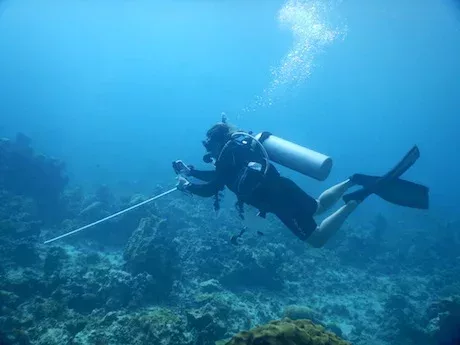In line with the International Coral Reef Initiative and the Global Coral Reef Monitoring Network guiding principles, the GCRMN in the Caribbean region has been growing as a renewed and dynamic network of coral reef experts sharing the goal of improving information on the status of coral reefs of the Caribbean. The GCRMN-Caribbean mission is to revitalize and strengthen coral reef monitoring to ensure the collection of useful, comparable and accessible data that can effectively reveal the status and trends of the coral reefs in the region, for regular, robust and strategic reporting to influence coastal management decision-making at the regional level.
Under the coordination of the Caribbean Environment Programme of the United Nations Environment Programme (UNEP-CEP) / Secretariat of the SPAW protocol and its Regional Activity Centre (SPAW-RAC), a core group of regional experts, composing the GCRMN-Caribbean Steering Committee, has been working since 2014 to encourage common and comparable data across the region, through the use of regional technical guidelines and by building and increasing scientific monitoring capacity of local stakeholders and practitioners, in particular Marine Protected Area (MPA) managers.
In this context, we are very glad to report on the first GCRMN-Caribbean integrated Coral Reef Monitoring Workshop held from 18-22 April under the framework of UNEP-CEP, and with the support of UNEP Coral Reef Unit, the SPAW-RAC, the University of the West Indies and a number of regional organizations and programmes.
Thirty-five coral reef scientists and coastal managers from several territories within and outside of the Wider Caribbean gathered at the Discovery Bay Marine Laboratory, Centre for Marine Sciences, University of the West Indies, on the north coast of Jamaica to participate in this scientific capacity-building event « GCRMN-Caribbean Guidelines Capacity Building Workshop: Towards comprehensive coral reef monitoring ». The objective of this five-day training workshop was to increase capacity for effective integrated coral reef monitoring among GCRMN-Caribbean countries through the use of bio-physical and socio-economic data in coastal management decision-making for improved standardized and strategic reporting at the regional level. The workshop introduced participants to the GCRMN-Caribbean bio-physical guidelines and socio-economic monitoring framework.
Led by an impressive team of coral reef scientists and experts from the Centre for Resource Management and Environmental Studies (CERMES) at The University of the West Indies (UWI); Scripps Institution of Oceanography, University of California, San Diego; the Waitt Institute; Reef Check Dominican Republic; Universidad Simon Bolivar; and the NOAA Coral Reef Conservation Program, the participants engaged in one of two training components, respectively dedicated to GCRMN-Caribbean bio-physical and socio-economic monitoring (SocMon) guidelines, but benefited from several opportunities during plenary sessions for sharing experiences from each component in an effort to further develop integrative aspects of coral reef monitoring.
Underwater fieldwork
Participants were trained in the coral reef monitoring methods proposed by the GCRMN-Caribbean, from field collection to data analysis, including photo-quadrats and introduction to the photo mosaic technique. Diving sessions conducted within the Discovery Bay Special Fishery Conservation Area (SFCA) served to strengthen trainees technical skills and improve data collection efficiency underwater. Designed to provide a framework and guidance to all coral reef monitoring practitioners in the region for standardizing data across the region, the GCRMN-Caribbean guidelines were well appreciated by all the participants who provided valuable feedback for finalization of the guidelines prior to presentation at the upcoming 13th International Coral Reef Symposium (ICRS) in July 2016 in Hawaii. Putting into perspective each local situation, capacities, needs and constraints, concrete next steps were defined for each country for adopting or adapting to the regional proposed ’’standards’’.
The SocMON team
Ten participants from government agencies, local non-governmental organisations (NGOs) and the Discovery Bay Marine Lab, from Jamaica and Cuba were trained in the Socio-economic Monitoring for Coastal Management (SocMon) methodology and the recently CERMES-developed SocMon Spatial tool. The SocMon training emphasized practical field exercises and teamwork, seeking to simulate real monitoring programmes as much as possible. The Discovery Bay SFCA was used as the demonstration study site for the duration of the training. Participants are keen to implement SocMon assessments at their sites as follow-up to this training and some even indicated their interest in becoming SocMon trainers. In charting next steps for SocMon at local coastal management sites, participants have indicated their capacity and resource needs, critical partners, priority sites, challenges, issues or concerns for initiating and implementing SocMon assessments and monitoring programmes, as well as key focal points for SocMon at the national level.
This workshop was also recognized as a real opportunity to strengthen the integration of all the participants in this Caribbean regional network, to train and identify future trainers, especially for future GCRMN-Caribbean workshops, to build new long-term collaborations between islands and reinforce territorial networks. A great example of that is the Jamaica Coral Reef Monitoring Network (JCRMN), for which Jamaican participants developed recommendations and next steps for improving and strengthening their monitoring efforts at the national level.
Recommendations and post workshops suggestions of actions were defined for each country represented, but also for the regional level, in order to help implement the guidelines, coordinate globally, reinforce integration and develop a specific guidance/guidebook. For instance, the suggestion of a Metadatabase gathering information on coral reef monitoring practitioners and organizations in the wider region will be further developed further, and the integrated approach will be reinforced from a scientific perspective in the future.
Building on the lessons learnt from this pilot workshop, the GCRMN-Caribbean will replicate this initiative at the national or sub-national level throughout the region over the coming years.We encourage all coral reef experts and conservation practitioners to get in touch with us , by contacting directly one of the Steering Committee members or the regional coordinator.
Source: http://www.car-spaw-rac.org/?First-GCRMN-Caribbean-integrated,665

